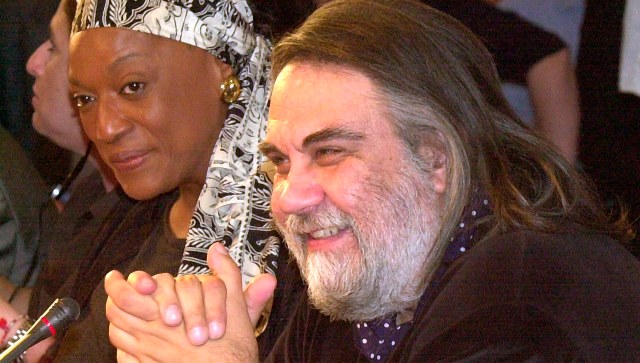In a charming scene in The Holiday, Jack Black’s character Miles walks around a Blockbuster store with Kate Winslet’s Iris, showing her DVDs of movies with iconic scores. Be it Jaws or The Graduate, Miles’ excitement to share his love for movie themes is endearingly received by Iris, who laughs at how he could effortlessly and uninhibitedly break out into loud scatting in a public place. He opens this “guess the score” game by showing Iris a DVD of Chariots of Fire, asking, “Have you watched this film?” Iris: Chariots of Fire. Loved it. Miles: It’s a great, great score by Vangelis. He took electronic scores to a new level that was ground-breaking. Even if he didn’t mention the name of the movie or the composer, his humming of the tune and the mimicking of the delayed drum claps would’ve been enough for us to instantly identify the movie he was talking about. That’s how powerful Vangelis’ score was. Also read: Vangelis, the Greek 'Chariots of Fire' composer, dies at 79 Over 40 years since, one of the first things we do when the name Chariots of Fire is mentioned, is to sing those six simple but memorable notes while gesturing a slo-mo run. There are many reasons why Titles, the only song that most people know from Chariots of Fire, remains just as legendary. To start with, most film scores are deeply intertwined with the visual they are augmenting. Without the images, the scores tend to lose a little of the impact because our memories link them inextricably. While that might be true to some extent even with Chariots of Fire when we uncontrollably move our hands in slow motion like runners in the video, the title track holds it own way beyond cinematic imagery. If the emblematic visual of men in white running slowly on a grey beach isn’t the crux of the film’s timelessness, then what is? Six very simple notes, played with baroque richness in a score so electronic. The various permutations and combinations of those six notes has gone down in cinematic history as the most resounding theme of resilience, of triumph against all odds, of monumental achievement, of sportsmanship and so much more. Until Chariots of Fire, electronica in cinema was commonly associated with futurism on screen. Something robotic, something out in space, something that wasn’t the “now”. The awe-inspiring success of Titles is a kind of unique sonic time-travel. Even without the men running on screen, Vangelis’ command over the late 70s-early 80s predilection for synth for a period film that was set in 1920, took scoring for cinema into a completely different direction. Something we enjoy even today. The horn-like sound heralds a distinguished, august mood, which is then gradually built on by the synth as pulsating notes criss-cross with the main melody creating a sense of elegant pomp and circumstance. The reverberating drum clap appears to coincide with the ebbing and swelling in the sonic mood, mimicking what it is like to run a race or even just live life. You imagine yourself there, working through the chase and throwing your hands up as you sprint your best through the finishing tape. There is exhilaration, there is melancholy and there is the unmatched sense of achievement you’re left with, perhaps breathless a little for living the ethos of the tune. Vangelis builds all of this into a kind of orchestral, florid crescendo on a sonic grammar of synth; that in itself is an achievement. The synthesizer until then was simply a stand in for the piano, for composers to show you a sample of their work without having to lug around the piano. Vangelis showed that it was entirely possible to create an immortal balance between melodic ostentation and delicate emotions through equipment that seem so futuristic. The song takes you on a journey where the main piano melody keeps coming back to inspire you as it changes and develops into different segments of the song. There’s a booming horn somewhere, a delicate fingering of the strings somewhere else but you are always taking a stride forward, timing it with the deliberately delayed and exaggerated drum clap. You pause for a breath, to look around you perhaps, before starting again as Vangelis creates that cyclical pattern of clever instrumentation. Every so often, a genius comes along to gently or even robustly change the course of an industry. When Chariots of Fire was released, people had no idea of how iconic its score was even though they slowly lapped up the title track. Greece-born Vangelis’ journey until that moment of winning the Oscar for a British film was nothing less than Olympian. In his lifetime, he didn’t consider the score his best (which is possibly true because Blade Runner stands out on a more holistic level), but what Chariots of Fire score did for composers in Hollywood was humongous. Vangelis undoubtedly ushered in an era of comfort with electronica that scoring hadn’t seen until then. In his passing, we are reminded of how influential and pathbreaking actions are always a sum of all the small steps and the simple notes. Much like that beach scene in Chariots of Fire. Senior journalist Lakshmi Govindrajan Javeri has spent a good part of two decades chronicling the arts, culture and lifestyles. Read all the Latest News , Trending News , Cricket News , Bollywood News , India News and Entertainment News here. Follow us on Facebook, Twitter and Instagram.
When Chariots of Fire was released, people had no idea of how iconic its score was even though they slowly lapped up the title track. Greece-born Vangelis’ journey until that moment of winning the Oscar for a British film was nothing less than Olympian
Advertisement
End of Article


)
)
)
)
)
)
)
)
)



